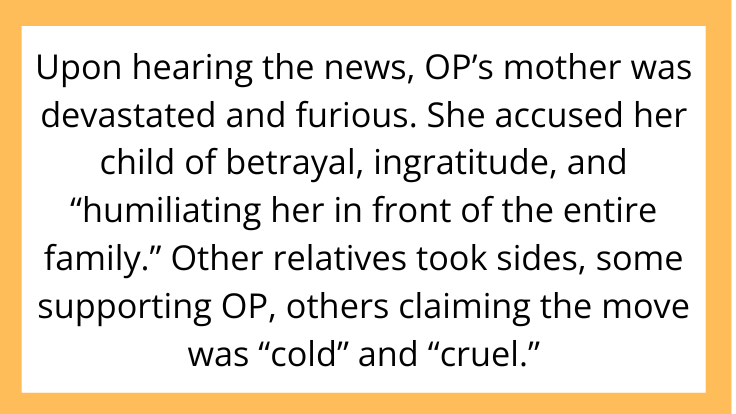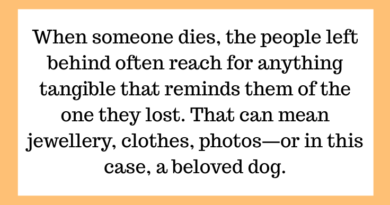AITAH for Not Inviting My Mom to My Wedding Because She Brings Too Much Drama?
Weddings are meant to be a celebration of love, unity, and new beginnings. But what if someone close to you—someone expected to be there—has a history of turning joyful events into emotional minefields? That’s the dilemma a Reddit user recently shared in r/AITAH, when they chose not to invite their own mother to their wedding, fearing she would bring tension, chaos, and conflict on what was meant to be the happiest day of their life.
This post sparked a firestorm of opinions online. Was the decision heartless, or a necessary act of self-preservation?
Let’s explore this deeply personal and emotionally charged scenario, and why sometimes protecting your peace means making painful choices.
The Scenario: A Mother-Daughter Relationship Fractured by Conflict

According to the original poster (OP), their relationship with their mom had always been difficult. The mother frequently criticized OP’s decisions, created scenes at family gatherings, and had even previously ruined OP’s college graduation party by arguing with extended relatives and storming out in tears.
When OP got engaged, they and their fiancé agreed the wedding should be low-stress and drama-free. After months of deliberation, OP decided not to invite their mother, fearing her presence would add anxiety to a day already full of pressure.
Upon hearing the news, OP’s mother was devastated and furious. She accused her child of betrayal, ingratitude, and “humiliating her in front of the entire family.” Other relatives took sides, some supporting OP, others claiming the move was “cold” and “cruel.”
So, AITAH for not inviting your own mom to your wedding if she’s historically been a source of pain?
Setting Boundaries: Selfish or Self-Care?

One of the biggest misconceptions about family is that you’re obligated to include people simply because they’re blood. But toxic dynamics can exist even in close families, and weddings often amplify those tensions.
Here’s what matters more than tradition:
-
Emotional safety: Your wedding should be a safe and happy event for you, not a minefield of triggers.
-
History of behavior: If someone has repeatedly disrupted important moments in your life, it’s valid to fear they might do it again.
-
Respect for boundaries: When people consistently violate boundaries, consequences aren’t cruelty—they’re clarity.
The idea that family must always be included, no matter the cost, often overlooks how damaging unhealed family trauma can be.
When Exclusion Feels Like Betrayal — From the Other Side

It’s also important to acknowledge that to the excluded party—especially a parent—being left out of a major life event like a wedding can feel like abandonment. Parents often see weddings as milestones they’re entitled to witness.
OP’s mom may genuinely feel hurt, embarrassed, and shut out. But pain doesn’t always equal injustice. Sometimes, people are hurt because of their own behavior catching up with them.
If you’re in a similar position, communicate as compassionately as possible:
-
Be honest but kind about your reasons.
-
Avoid blame language. Use “I” statements.
-
Offer alternative ways to be involved—maybe a private moment before or after the ceremony, if it feels safe.
Navigating the Fallout: Managing Family Reactions

When you make a bold decision like this, expect blowback. Relatives may:
-
Pressure you to “keep the peace.”
-
Guilt-trip you by saying, “She’s your mother.”
-
Accuse you of being cold, dramatic, or selfish.
But here’s the truth: no one else has lived your experience. They haven’t seen every outburst, felt every moment of anxiety, or been the target of every guilt trip.
Stand firm in your boundaries, and remember that protecting your peace is not the same as creating conflict—it’s preventing it.
What Reddit Had to Say

The Reddit community was, as always, divided but thoughtful. Many users shared their own experiences of excluding toxic family members from weddings, funerals, and other major life events. Common themes emerged:
-
“You’re not the bad person for protecting your peace.”
-
“She made her bed—now she doesn’t like lying in it.”
-
“You can love someone and still not let them hurt you again.”
Others urged OP to consider long-term regrets and whether a limited invitation or separate meeting might offer closure. But the overwhelming response was in favor of OP setting and maintaining healthy boundaries.
Final Thoughts: Choosing Peace Over Pressure

Weddings are high-stakes emotional events—and no one wants to look back on theirs with regret. If you’ve repeatedly been harmed, stressed, or manipulated by someone, it’s okay to prioritize peace, even on your wedding day.
You’re not obligated to invite anyone—family or not—who has proven to be disruptive to your happiness. Boundaries don’t mean you don’t love someone. They mean you love yourself enough to protect your peace.



